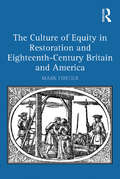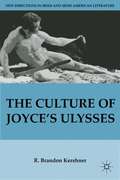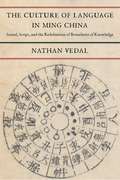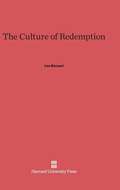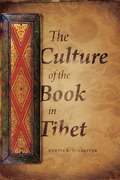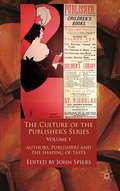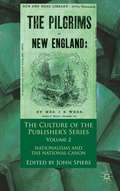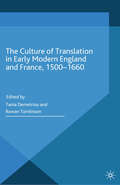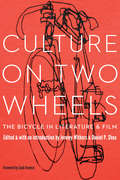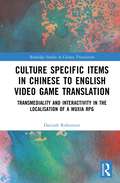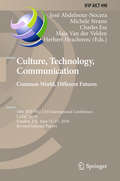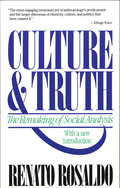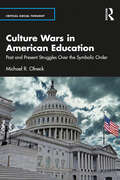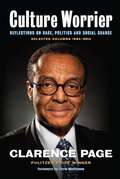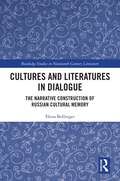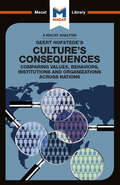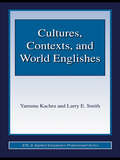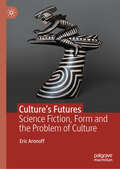- Table View
- List View
The Culture of Equity in Restoration and Eighteenth-Century Britain and America
by Mark FortierDrawing on politics, religion, law, literature, and philosophy, this interdisciplinary study is a sequel to Mark Fortier’s bookThe Culture of Equity in Early Modern England (Ashgate, 2006). The earlier volume traced the meanings and usage of equity in broad cultural terms (including but not limited to law) to position equity as a keyword of valuation, persuasion, and understanding; the present volume carries that work through the Restoration and eighteenth century in Britain and America. Fortier argues that equity continued to be a keyword, used and contested in many of the major social and political events of the period. Further, he argues that equity needs to be seen in this period largely outside the Aristotelian parameters that have generally been assumed in scholarship on equity.
The Culture of Joyce’s Ulysses
by R. Brandon KershnerReading Ulysses with an eye to the cultural references embedded within it, Kershner interrogates modernism's relationship to contemporary popular culture and literature. Examples underscore Kershner's corrective to formal approaches to genre as he broadens the methodologies that are used to study it to include social and political approaches.
The Culture of Language in Ming China: Sound, Script, and the Redefinition of Boundaries of Knowledge
by Nathan VedalThe scholarly culture of Ming dynasty China (1368–1644) is often seen as prioritizing philosophy over concrete textual study. Nathan Vedal uncovers the preoccupation among Ming thinkers with specialized linguistic learning, a field typically associated with the intellectual revolution of the eighteenth century. He explores the collaboration of Confucian classicists and Buddhist monks, opera librettists and cosmological theorists, who joined forces in the pursuit of a universal theory of language.Drawing on a wide range of overlooked scholarly texts, literary commentaries, and pedagogical materials, Vedal examines how Ming scholars positioned the study of language within an interconnected nexus of learning. He argues that for sixteenth- and seventeenth-century thinkers, the boundaries among the worlds of classicism, literature, music, cosmology, and religion were far more fluid and porous than they became later. In the eighteenth century, Qing thinkers pared away these other fields from linguistic learning, creating a discipline focused on corroborating the linguistic features of ancient texts.Documenting a major transformation in knowledge production, this book provides a framework for rethinking global early modern intellectual developments. It offers a powerful alternative to the conventional understanding of late imperial Chinese intellectual history by focusing on the methods of scholarly practice and the boundaries by which contemporary thinkers defined their field of study.
The Culture of Piracy, 1580–1630: English Literature and Seaborne Crime (Transculturalisms, 1400-1700)
by Claire JowittListening to what she terms 'unruly pirate voices' in early modern English literature, in this study Claire Jowitt offers an original and compelling analysis of the cultural meanings of 'piracy'. By examining the often marginal figure of the pirate (and also the sometimes hard-to-distinguish privateer) Jowitt shows how flexibly these figures served to comment on English nationalism, international relations, and contemporary politics. She considers the ways in which piracy can, sometimes in surprising and resourceful ways, overlap and connect with, rather than simply challenge, some of the foundations underpinning Renaissance orthodoxies-absolutism, patriarchy, hierarchy of birth, and the superiority of Europeans and the Christian religion over other peoples and belief systems. Jowitt's discussion ranges over a variety of generic forms including public drama, broadsheets and ballads, prose romance, travel writing, and poetry from the fifty-year period stretching across the reigns of three English monarchs: Elizabeth Tudor, and James and Charles Stuart. Among the early modern writers whose works are analyzed are Heywood, Hakluyt, Shakespeare, Sidney, and Wroth; and among the multifaceted historical figures discussed are Francis Drake, John Ward, Henry Mainwaring, Purser and Clinton. What she calls the 'semantics of piracy' introduces a rich symbolic vein in which these figures, operating across different cultural registers and appealing to audiences in multiple ways, represent and reflect many changing discourses, political and artistic, in early modern England. The first book-length study to look at the cultural impact of Renaissance piracy, The Culture of Piracy, 1580-1630 underlines how the figure of the Renaissance pirate was not only sensational, but also culturally significant. Despite its transgressive nature, piracy also comes to be seen as one of the key mechanisms which served to connect peoples and regions during this period.
The Culture of Redemption
by Leo BersaniIn this frankly polemical book, Leo Bersani does battle with a pervasive view in modern culture: the idea that art can save us from the catastrophes of history and sexuality. Bersani questions this assumption and ranges widely through modern literature to prove his point. He makes fascinating comparisons between Melanie Klein and Marcel Proust; the enigmatic and more unresolved works of Freud; Walter Benjamin, Baudelaire, and Nietzsche; André Malraux and Georges Bataille; Flaubert, Melville, Joyce and Thomas Pynchon.
A Culture of Rights: Law, Literature, and Canada
by Benjamin James AuthersWith the passage into law of the Canadian Charter of Rights and Freedoms in 1982, rights took on new legal, political, and social significance in Canada. In the decades following, Canadian jurisprudence has emphasised the importance of rights, determining their shape and asserting their centrality to legal ideas about what Canada represents. At the same time, an increasing number of Canadian novels have also engaged with the language of human rights and civil liberties, reflecting, like their counterparts in law, the possibilities of rights and the failure of their protection.In A Culture of Rights, Benjamin Authers reads novels by authors including Joy Kogawa, Margaret Atwood, Timothy Findley, and Jeanette Armstrong alongside legal texts and key constitutional rights cases, arguing for the need for a more complex, interdisciplinary understanding of the sources of rights in Canada and elsewhere. He suggests that, at present, even when rights are violated, popular insistence on Canada's rights-driven society remains. Despite the limited scope of our rights, and the deferral of more substantive rights protections to some projected, ideal Canada, we remain keen to promote ourselves as members of an entirely just society.
The Culture of Singapore English
by Jock O. WongThis book provides a fresh approach to Singapore English, by focusing on its cultural connotations. The author, a native Singaporean, explores a range of aspects of this rich variety of English - including address forms, cultural categories, particles and interjections - and links particular words to particular cultural norms. By using the Natural Semantic Metalanguage (NSM) approach, which is free from technical terminology, he explains the relationship between meaning and culture with maximal clarity, and an added strength of this study lies in its use of authentic examples and pictures, which offer a fascinating glimpse of Singaporean life. Through comparisons with Anglo English, it also explores some difficulties associated with Standard English and cultural misunderstanding. Lending a unique local perspective and written with an incisiveness that makes it ideal for both academic and non-academic readers, this book will appeal to all those interested in Singapore English and its cultural values.
The Culture of the Body: Genealogies of Modernity
by Dalia JudovitzWhat is the body? How was it culturally constructed, conceived, and cultivated before and after the advent of rationalism and modern science? This interdisciplinary study elaborates a cultural genealogy of the body and its legacies to modernity by tracing its crucial redefinition from a live anatomical entity to disembodied, mechanical and virtual analogs. The study ranges from Baroque, pre-Cartesian interpretations of body and embodiment, to the Cartesian elaboration of ontological difference and mind-body dualism, and it concludes with the parodic and violent aftermath of this legacy to the French Enlightenment. It engages work by philosophical authors such as Montaigne, Descartes and La Mettrie, as well as literary works by d'Urfé, Corneille and the Marquis de Sade. The examination of sexuality and the emergence of sexual difference as a dominant mode of embodiment are central to the book's overall design. The work is informed by philosophical accounts of the body (Nietzsche, Foucault, Merleau-Ponty), by feminist theory (Butler, Irigaray, Bordo), as well as by literary and cultural historians (Scarry, Stewart, Bynum, etc.) and historians of science (Canguilhem, Pagel, and Temkin), among others. It will appeal to scholars of literature, philosophy, French studies, critical theory, feminist theory, cultural historians and historians of science and technology.
The Culture of the Book in Tibet
by Kurtis SchaefferThe history of the book in Tibet involves more than literary trends and trade routes. Functioning as material, intellectual, and symbolic object, the book has been an instrumental tool in the construction of Tibetan power and authority, and its history opens a crucial window onto the cultural, intellectual, and economic life of an immensely influential Buddhist society.Spanning the fourteenth to the eighteenth centuries, Kurtis R. Schaeffer envisions the scholars and hermits, madmen and ministers, kings and queens who produced Tibet's massive canons. He describes how Tibetan scholars edited and printed works of religion, literature, art, and science and what this indicates about the interrelation of material and cultural practices. The Tibetan book is at once the embodiment of the Buddha's voice, a principal means of education, a source of tradition and authority, an economic product, a finely crafted aesthetic object, a medium of Buddhist written culture, and a symbol of the religion itself. Books stood at the center of debates on the role of libraries in religious institutions, the relative merits of oral and written teachings, and the economy of religion in Tibet.A meticulous study that draws on more than 150 understudied Tibetan sources, The Culture of the Book in Tibet is the first volume to trace this singular history. Through a single object, Schaeffer accesses a greater understanding of the Tibetan plateau.
The Culture of the Publisher’s Series, Volume One
by John SpiersThis volume focuses on the publisher's series as a cultural formation - a material artefact and component of cultural hierarchies. Contributors engage with archival research, cultural theory, literary and bibliometric analysis (amongst a range of other approaches) to contextualize the publisher's series in terms of its cultural and economic work.
The Culture of the Publisher’s Series, Volume Two
by John SpiersThis volume explores problems concerning the series, national development and the national canon in a range of countries and their international book-trade relationships. Studies focus on issues such as the fabrication of a national canon, and on the book in war-time, the evolution of Catholic literature, imperial traditions and colonial libraries.
The Culture of the Seven Years' War
by Frans De Bruyn Shaun ReganThe Seven Years' War (1756-1763) was the decisive conflict of the eighteenth century - Winston Churchill called it the first "world war" - and the clash which forever changed the course of North American history. Yet compared with other momentous conflicts like the Napoleonic Wars or the First World War, the cultural impact of the Seven Years' War remains woefully understudied.The Culture of the Seven Years' War is the first collection of essays to take a broad interdisciplinary and multinational approach to this important global conflict. Rather than focusing exclusively on political, diplomatic, or military issues, this collection examines the impact of representation, identity, and conceptions and experiences of empire.With essays by notable scholars that address the war's impact in Europe and the Atlantic world, this volume is sure to become essential reading for those interested in the relationship between war, culture, and the arts.
The Culture of Translation in Early Modern England and France, 1500–1660
by Tania Demetriou Rowan TomlinsonThis book explores modalities and cultural interventions of translation in the early modern period, focusing on the shared parameters of these two translation cultures. Translation emerges as a powerful tool for thinking about community and citizenship, literary tradition and the classical past, certitude and doubt, language and the imagination.
Culture on Two Wheels: The Bicycle in Literature and Film
by Jeremy Withers Daniel P. Shea Zack FurnessBicycles have more cultural identities than many realize, functioning not only as literal vehicles in a text but also as “vehicles” for that text’s themes, ideas, and critiques. In the late nineteenth century the bicycle was seen as a way for the wealthy urban elite to reconnect with nature and for women to gain a measure of personal freedom, while during World War II it became a utilitarian tool of the French Resistance and in 1970s China stood for wealth and modernization. Lately it has functioned variously as the favored ideological steed of environmentalists, a means of community bonding and aesthetic self-expression in hip hop, and the ride of choice for bike messenger–idolizing urban hipsters. Culture on Two Wheels analyzes the shifting cultural significance of the bicycle by examining its appearances in literary, musical, and cinematic works spanning three continents and more than 125 years of history. Bringing together essays by a variety of cyclists and scholars with myriad angles of approach, this collection highlights the bicycle’s flexibility as a signifier and analyzes the appearance of bicycles in canonical and well-known texts such as Samuel Beckett’s modernist novel Molloy, the Oscar-winning film Breaking Away, and various Stephen King novels and stories, as well as in lesser-known but equally significant texts, such as the celebrated Russian director Andrei Tarkovsky’s film Sacrifice and Elizabeth Robins Pennell’s nineteenth-century travelogue A Canterbury Pilgrimage, the latter of which traces the route of Chaucer’s pilgrims via bicycle. Listen to an interview with the author.
Culture Specific Items in Chinese to English Video Game Translation: Transmediality and Interactivity in the Localisation of a Wuxia RPG (Routledge Studies in Chinese Translation)
by Dariush RobertsonCulture Specific Items in Chinese to English Video Game Translation aims to investigate the Chinese to English translation of culture-specific items (CSIs) in the localisation of a wuxia role-playing game (RPG). This monograph provides groundbreaking insight into authentic practice and analyses a case study with theories from both translation studies and sociology to address questions such as how linguists translate CSIs, why they use certain approaches, and what is revealed when both the translation behaviour and the reasons underpinning their practice are considered in context. This book will be primarily of interest to scholars in the fields of translation studies, localisation, video game translation, and Chinese to English translation. It will also be of interest to a wider range of scholars interested in China, video games, and the application of social theory.
Culture, Technology, Communication. Common World, Different Futures: 10th IFIP WG 13.8 International Conference, CaTaC 2016, London, UK, June 15-17, 2016, Revised Selected Papers (IFIP Advances in Information and Communication Technology #490)
by Charles Ess José Abdelnour-Nocera Michele Strano Maja Van der Velden Herbert HrachovecThis volume constitutes the refereed post-conference proceedings of the 10th IFIP WG 13. 8 International Conference on Culture, Technology, and Communication, CaTaC 2016, held in London, UK, in June 2016. The 9 revised full papers were carefully reviewed and selected from 22 submissions. The papers explore the intersections between culture, technology, and communication, applying different theoretical and methodological perspectives, genres, and styles. They deal with cultural attitudes towards technology and communication, interaction design, and international development.
Culture & Truth
by Renato RosaldoCulture and Truth argues for a new approach to thinking and writing about culture. Exposing the inadequacies of old conceptions of static, monolithic cultures, and of detached, objective observers, Renato Rosaldo argues that new ethnographic writing must come to terms with the dynamic nature of social reality - with history, spontaneity, and human emotions. To move forward, anthropologists and other observers of culture must describe human lives in their rich variety, as ever-changing, mysterious and unpredictable rather than rigid and fixed. In remaking social analysis, their work must therefore acknowledge and celebrate diversity, narrative, emotion, and the unavoidability of subjectivity. Rosaldo's vision of social analysis concentrates on borders - the lines along which different groups work and live with divergent understandings. Drawing upon his own background as a Chicano as well as upon the works of three Chicano writers, Rosaldo claims that cultures by their very nature are heterogenous and always working in the realm of borders.
Culture Wars in American Education: Past and Present Struggles Over the Symbolic Order (Critical Social Thought)
by Michael R. OlneckCulture Wars in American Education: Past and Present Struggles Over the Symbolic Order radically questions norms and values held within US Education and analyses why and how culture wars in American education are intense, consequential, and recurrent.Applying the concept of “symbolic order,” this volume elaborates ways in which symbolic representations are used to draw boundaries, allocate status, and legitimate the exercise of authority and power within American schooling. In particular, the book illustrates the “terms of inclusion” by which full membership in the national community is defined, limited, and contested. It suggests that repetitive patterns in the symbolic order, for example, the persistence of the representation of an individualistic basis of American society and polity, constrain the reach of progressive change. The book examines the World War I era Americanization movement, the World War II era Intercultural Education movement, the late-twentieth-century Multicultural Education movement, continuing right-wing assaults on Ethnic Studies and Critical Race Theory in the first decades of the twenty-first century, and historical and contemporary conflicts over the incorporation of languages other than Standard English into approved instructional approaches.In the context of continuing culture wars in the United States and across the globe, this book will be of interest to graduate students and scholars in critical studies of education, history of education, sociology of education, curriculum theory, Multicultural Education, and comparative education, as well as to educators enmeshed in contemporary tensions and conflicts.
Culture Worrier: Selected Columns 19842014
by Clarence Page Chris MatthewsPulitzer Prize winner Clarence Page is one of the most nationally recognized and highly regarded syndicated columnists in the country, and his newest book, Culture Worrier: Selected Columns 1984-2014, commemorates the 30th anniversary of his column's first appearance in the Chicago Tribune. It is the first such collection of his columns, and a long overdue archive of his best work, covering topics such as politics, social issues, pop culture, race, family, new media, prominent figures, as well as his own personal life.Page has been a broadcast mainstay for decades, delivering his sensible and balanced perspective on The MacLaughlin Group, NewsHour with Jim Lehrer, NPR's Weekend Edition, MSNBC's Chris Matthews Show, and many other popular shows. His column, which is featured in over 150 newspapers, provides keen and clever insight on the day's most pressing political and social issues. While Page is known for his liberal-leaning views, readers have always appreciated his unbiased approach in directing criticism across the political spectrum, to any individual person or general issue deserving of examination.Culture Worrier: Selected Columns 1984-2014 is sure to be one of the most entertaining and fascinating column collections in recent years, bringing Page's unique perspective within the African-American and political communities, and wealth of fascinating experiential knowledge, to the foreground of our ongoing national dialogue. As a veteran media member who has lived through the transition from print's heyday to modern mobile publishing, from the Vietnam War through the wars in Afghanistan and Iraq, and from the Civil Rights movement to the election of Barack Obama, Page is one of the most revered and uniquely qualified commentators of our time. This book will certainly be a bookshelf staple for the informed who favor balanced criticism of major current affairs and political events.
Cultures and Literatures in Dialogue: The Narrative Construction of Russian Cultural Memory (Routledge Studies in Nineteenth Century Literature)
by Elena BollingerThis book addresses the narrative construction of Russian cultural memory in the work of Julian Barnes. It investigates how Barnes's texts tend to display a memory process as a transcultural mode of the creation of English and Russian national identities. Examining a need to revisit Russian canonical works, the detailed discursive analysis of the selected English texts exposes an intertextual remembering by duplication, thus contributing to the prevention of forgetting through the recuperation of still misrecollected cultural meanings. By creatively incorporating Russian intertextual elements into his work as a novelist, the author seems to insist on sweeping across and beyond national boundaries, revealing how frail the invention of tradition is when leading to the illusion of a solid collective memory and its political legitimation. The book considers not only a constructive dialogue between Barnes’s fiction and Russian classical literature, but also this writer’s interpretative, mostly imaginative, integration of Russian literature and culture into his work as a novelist. Exploring the double meaning of a literary metaphor as a mnemonic image of memory and a product of imagination, it offers a comprehensive analysis of Barnes’s texts which play with intertextuality as an efficient tool of displacement of official memory, providing a deeper understanding of historical and cultural processes related to the constantly moving architecture of transcultural memory.
Culture's Consequences: Comparing Values, Behaviors, Institutes and Organizations across Nations (The Macat Library)
by Katherine ErdmanThe Dutch anthropologist Geert Hofstede is recognized as a pioneer in the fields of international management and social psychology – and his work is a perfect example of the ways in which interpretative skills can help solve problems and provide the foundation for strong thinking and understanding both in business and beyond. Hofstede’s central achievement was setting up an efficient interpretative framework for understanding the cultural differences between one country and another. Working for the international computing company IBM in the late 1960s, Hofstede noted that such cultural differences had huge consequences for international organizations. Up until then, while many inside and outside of business recognized the importance of these differences, little had been done to define precisely what cultural difference was and in what areas of life it was expressed. Hofstede’s insight was that if one could interpret and define the dimensions of cultural difference, it would be possible to measure them and act accordingly. From a vast survey of IBM’s employees in several countries, Hofstede originally defined five dimensions of culture: every society could be rated for each dimension, providing a useful guide to the kinds of cultural differences at play. As ever, good interpretative skills provided the basis for better understanding.
Cultures, Contexts, and World Englishes
by Yamuna Kachru Larry E. SmithThis volume aims to familiarize readers with the varieties of world Englishes used across cultures and to create awareness of some of the linguistic and socially relevant contexts and functions that have given rise to them. It emphasizes that effective communication among users of different Englishes requires awareness of the varieties in use and their cultural, social, and ideational functions. Cultures, Contexts and World Englishes: demonstrates the rich results of integrating theory, methodology and application features critical and detailed discussion of the sociolinguistics of English in the globalized world gives equal emphasis to grammar and pragmatics of variation and to uses of Englishes in spoken and written modes in major English-using regions of the world. Each chapter includes suggestions for further reading and challenging discussion questions and appropriate research projects designed to enhance the usefulness of this volume in courses such as world Englishes, English in the Global Context, Sociolinguistics, Critical Applied Linguistics, Language Contact and Convergence, Ethnography of Communication, and Crosscultural Communication.
Culture’s Futures: Science Fiction, Form and the Problem of Culture
by Eric AronoffThis book argues that science fiction has been a key participant, along with anthropology and literary theory, in the interdisciplinary debates over “culture” and narrative form from the modernist period to the present. Both science fiction and the anthropological ethnography, in their modernist forms and post-modern/postcolonial reinventions, are intertwined technologies for constructing “culture” and difference through narrative worldbuilding. This book traces the ways SF authors -- including Ray Bradbury, Ursula K. Le Guin, and Octavia E. Butler, as well as Indigenous futurists Craig Strete, Celu Amberstone, Rebecca Roanhorse and Cherie Dimaline -- have deployed, interrogated and revised these models of “culture,” representation and power to imagine new futures.
Cultures in Conflict (Great Minds Wit & Wisdom #Grade 5, Module 1)
by Ann Brigham Lauren Chapalee Lorraine GriffithNIMAC-sourced textbook
